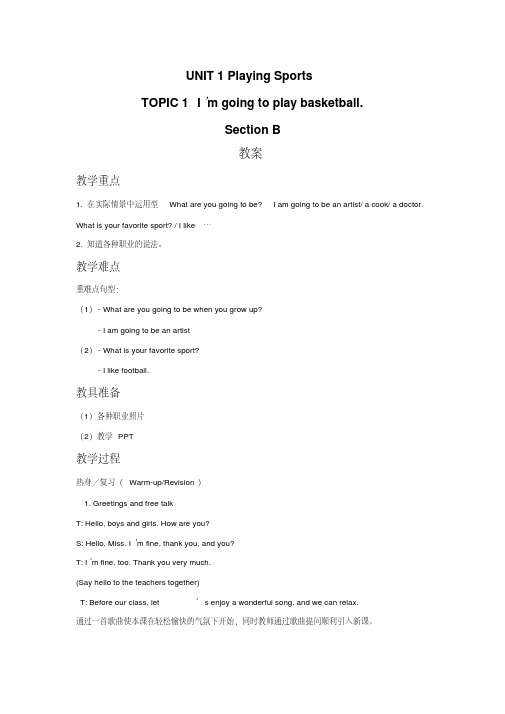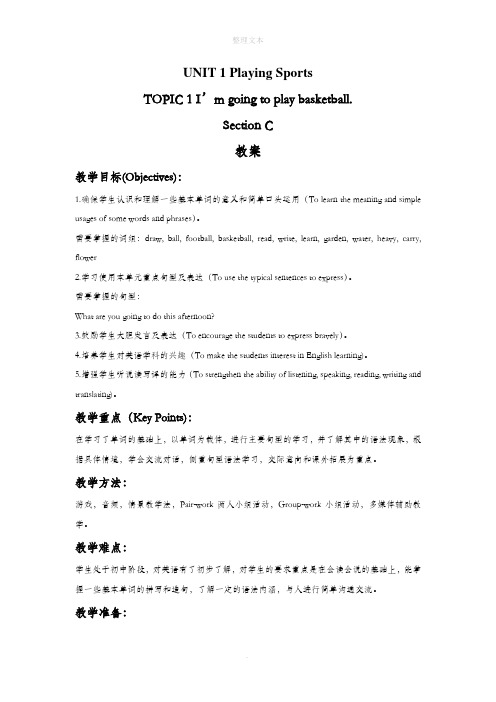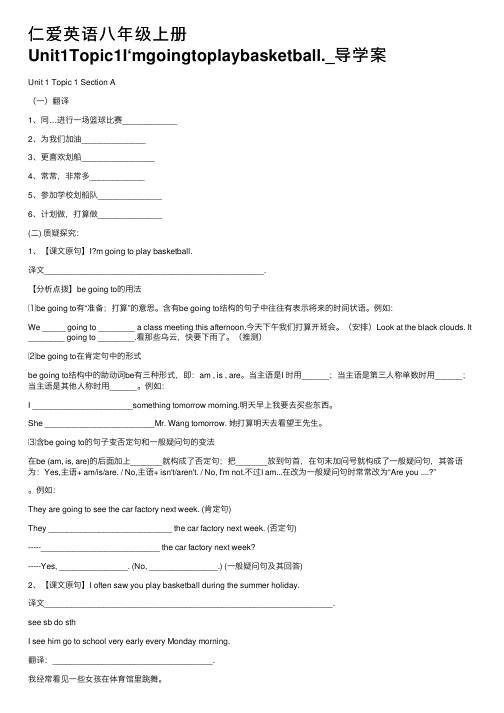仁爱版八年级英语上册Unit1 Topic1教案
仁爱版八年级英语上册UNIT1TOPIC1SectionB教案

fantastic.
Students repeat.
T: OK, now please tell me, what are you going to be when you grow up?
Ss: …
Write on the blackboard. Read the sentences.
Make a dialog. Show some pairs.
… but do you know what things
… should do? Ss:
…
T: Yes, you are right. Well
…teaIctheinrks can do so many things, let
’ s have a loes.
T: The teachers can design a class, learn knowledge and play with children. L ook. Wow, that ’ s
(Say hello to the teachers together)
T: Before our class, let
’ s enjoy a wonderful song, and we can relax.
通过一首歌曲使本课在轻松愉快的气氛下开始,同时教师通过歌曲提问顺利引入新课。
呈现新课
1. Lead in. T: What a wonderful song! That sounds great. Do you know who sings the song? Ss: … T: Yes, you are right. XXX is a famous singer, and there is another famous person, I think maybe you know him. What is your favorite activity? Ss: I like play basketball after school. T: That ’s great! Show the picture of Yao Ming. T: He is Yao Ming, he is a basketball player. Singer and basketball player are jobs. Now there are many other jobs, do you want to know what they are? Ss: Yes. T: OK, I will show you. Show many pictures. Let students talk about what they are, then check them. T: Do you know what else jobs? Ss: … T: Today I want to show you other two jobs, they are player and teacher. 2. New knowledge. Show the pictures of player and teacher. Students read the words follow the teacher. Read the words one by one. T: Do you want to be a player? Ss: … T: Do you want to be a teacher? Ss: … T: I am going to be a player. I am going to be a teacher. Write on the blackboard. Students follow the teacher to read the sentences. 3. Ask and answer T: They are both good jobs, but I think maybe in the future, you will be only one of them, so please tell me, what are you going to be when you grow up?
仁爱版英语八年级上册UNIT 1 TOPIC 1 Section C 教案

UNIT 1 Playing SportsTOPIC 1 I’m going to play basketball.Section C教案教学目标(Objectives):1.确保学生认识和理解一些基本单词的意义和简单口头运用(To learn the meaning and simple usages of some words and phrases)。
需要掌握的词组:draw, ball, football, basketball, read, write, learn, garden, water, heavy, carry, flower2.学习使用本单元重点句型及表达(To use the typical sentences to express)。
需要掌握的句型:What are you going to do this afternoon?3.鼓励学生大胆发言及表达(To encourage the students to express bravely)。
4.培养学生对英语学科的兴趣(To make the students interest in English learning)。
5.增强学生听说读写译的能力(To strengthen the ability of listening, speaking, reading, writing and translating)。
教学重点(Key Points):在学习了单词的基础上,以单词为载体,进行主要句型的学习,并了解其中的语法现象,根据具体情境,学会交流对话,侧重句型语法学习,交际意向和课外拓展为重点。
教学方法:游戏,音频,情景教学法,Pair-work两人小组活动,Group-work小组活动,多媒体辅助教学。
教学难点:学生处于初中阶段,对英语有了初步了解,对学生的要求重点是在会读会说的基础上,能掌握一些基本单词的拼写和造句,了解一定的语法内涵,与人进行简单沟通交流。
仁爱版新版八年级(上册)英语Unit1topic1SectionA课件

Me, too.常用于自己的做法或想法与别人的一致时。 e.g. —I like drinking milk in the morning.我喜欢早晨喝牛 奶。
—Me, too. 我也是。
also , as well
also, 也 I also like drinking milk in the morning
Join参加,加入
• join+ 团体 • join in通常指参加某种活动,尤其指和其他人一起参加某
项活动。 ①May I join in the game?我可以参加这个比赛吗? take part in指参加群众性活动、会议、劳动、游行等,往 往指参加者持有积极的态度,起一份作用,有时与join in 可互换。例句: • We should take part in school activities.我们应该积极参 加学校的活动。 = join in
He is going to write a letter tonight.
He will write a book one day.
see sb. do sth.看见某人做了某事;强调看见动作的全过 程,现在动作已结束。 see sb. doing sth. 看见某人正在做某事,强调动作正在进行。
—I’m going to play soccer. 我要去踢足球。
另外它还可以表示预测。 e.g. Look at the sky. It’s going to rainoing to与will两者都可表示将要发生的事、 将要去做某事,但它们有如下几点区别:
be going to表示近期、眼下就要发生的事情, will 表示的将来时间则较远一些,如:
• prefer 更喜欢+ 名词/动名词/不定式 • P 109 • I prefer apples. • I prefer playing basketball. • I prefer to play basketball.
仁爱版八年级英语上册Unit1 Topic1 Section A优质课教案设计

Unit1 Playing SportsTopic1 I’m going to play basketball.SectionA 优质课教案教学设计思路:本节课主要活动为SectionA的1a。
通过1a中Michael和Kangkang的对话,呈现了本课所要学的语法重点:be going to do结构表示一般将来时。
首先通过一首英文歌曲引入be going to do句型和运动。
由一个短视频让学生了解更多运动后,让学生看图片说运动。
再由歌曲唱出单词和句型。
然后通过小游戏和音频结合,让学生听音辨运动,从而巩固新单词。
然后由拖延症患者Mr.—Going—to—do 引出be going to do句型进行反复练习。
再根据学生的周日计划,导入Michael 和Kangkang的周日计划,对1a进行泛听,并完成1b。
接着学生通过看视频精听对话,判断1c四种说法是否正确。
在充分听和读1a对话内容之后,根据1a 造句。
然后整合1a和1d内容并改编,结合当下大热的电视剧《择天记》进行对话练习,再次巩固课文内容。
最后小组合作写一篇暑假计划报告,升华本课内容。
I. Teaching aims1. Knowledge aims:(1)学习并掌握关于运动的新词汇:football, row, table tennis,…(2)能正确运用be going to do表达自己的计划。
2. Skill aims:(1)能听懂有关运动计划简单对话和陈述。
(2)能正确地口头表达有关运动计划的话题。
(3)通过对SectionA的学习,学生能够写出自己的暑假计划,并讨论各自将要做的事。
3. Emotional aims:(1)帮助学生养成运动的好习惯,学会强身健体,唤醒学生的运动意识。
(2)培养学生的执行能力,拒绝拖延。
Ⅱ.The key points and difficult points1. Key points:能正确、熟练地运用be going to do句型。
仁爱版英语八年级上第一单元第一话题教案

八年级上册教案设计Unit 1 Playing SportsTopic 1 I’m going to play basketball.Section AⅠ. Material analysis本课时的主要活动为1a和2。
通过Michael和Kangkang的对话,呈现了本课所要学的语法重点:将来时be going to do结构。
结合本单元的话题Playing Sports, 呈现了重点短语:play basketball/football, have a basketball/football game, cheer … on, win (the game), prefer doing等。
Playing Sports这个话题和学生们的生活紧密相连,容易激发学生的学习兴趣。
但要正确使用be going to do 对学生来说还是有一定困难的。
困难一:be动词和主语不一致(多数学生);困难二:不会正确地将do替换成具体动词(少数学生)。
所以,要求老师以课本文本内容为依据,结合学生的实际生活,引导学生正确地使用be going to do谈论自己的运动计划,并能用书面表达形式写出自己的运动计划。
Ⅱ. Teaching aimsKnowledge aims:1. 能根据音标正确朗读出下列单词表中的单词:team, win, cheer, row, quite, during,against, practice…2. 能正确拼读并运用单词表中的黑体单词。
3. 能正确运用be going to do 表达运动计划。
4. 能正确地运用prefer doing结构表达喜好,如:prefer swimming, prefer rowing等。
5. 能运用本课所学语言,就自己的运动计划与他人交流。
Skill aims:1. 能听懂有关运动计划和运动爱好的简单对话和陈述。
2. 能正确地口头表达有关运动计划和运动爱好的话题。
仁爱英语八年级上册Unit1Topic1I‘mgoingtoplaybasketball._导学案

仁爱英语⼋年级上册Unit1Topic1I‘mgoingtoplaybasketball._导学案Unit 1 Topic 1 Section A(⼀)翻译1、同…进⾏⼀场篮球⽐赛____________2、为我们加油______________3、更喜欢划船________________4、常常,⾮常多____________5、参加学校划船队______________6、计划做,打算做______________(⼆) 质疑探究:1、【课⽂原句】I?m going to play basketball.译⽂________________________________________________.【分析点拨】be going to的⽤法⑴be going to有“准备;打算”的意思。
含有be going to结构的句⼦中往往有表⽰将来的时间状语。
例如:We _____ going to ________ a class meeting this afternoon.今天下午我们打算开班会。
(安排)Look at the black clouds. It ________ going to ________.看那些乌云,快要下⾬了。
(推测)⑵be going to在肯定句中的形式be going to结构中的助动词be有三种形式,即:am , is , are。
当主语是I 时⽤______;当主语是第三⼈称单数时⽤______;当主语是其他⼈称时⽤______。
例如:I ______________________something tomorrow morning.明天早上我要去买些东西。
She ________________________Mr. Wang tomorrow. 她打算明天去看望王先⽣。
⑶含be going to的句⼦变否定句和⼀般疑问句的变法在be (am, is, are)的后⾯加上_______就构成了否定句;把_______放到句⾸,在句末加问号就构成了⼀般疑问句,其答语为:Yes,主语+ am/is/are. / No,主语+ isn't/aren't. / No, I'm not.不过I am...在改为⼀般疑问句时常常改为“Are you ....?”。
仁爱版八年级英语上册UNIT 1 TOPIC 1 Section A教案
UNIT 1 Playing SportsTOPIC 1 I“m going to play basketball.Section A教案教学重点1.能够听、说、认读句型:“What are you going to do?I“m going to the cinema.“并能对其中的动词和时间短语进行替换操练。
2.能够听、说、认读动词短语:play football,play basketball, go to the cinema, read a magazine.3.能够听、说、读、写时间短语:next week,this morning/afternoon/evening;并能够听、说、认读时间短语:tomorrow,tonight.4.能够在Pair work中合理安排自己的活动时间并与他人进行交流。
教学难点能够听、说、读、写going to do句型中的动词和时间短语对将来的活动进行表述。
教具准备1.教师准备动词短语卡片,如:play football,play basketball等。
2.教师准备listen, look and say部分的教学挂图。
3.教师准备录音机和本课时的录音带。
教学过程热身/复习(Warm-up/Revision)1. Greetings and free talkT: Hello, boys and girls. How are you?S: Hello, Miss. I’m fine, thank you, and you?T: I’m fine, too. Thank you very much.(Say hello to the teachers together)教师课前放歌曲“What Are You Going to Do?“学生初步感知be going to do句型。
师生进行日常会话,可将重点放在动词短语的问答上,如:T:What day is it today ?S:It“s Tuesday.T:What day is it tomorrow ?S:It“s Wednesday.T:What do you usually do On Wednesdays/in the evening?S:I usually read books.呈现新课1. Lead in(1)学生朗读书本段落进行学习。
仁爱八年级上册英语Topic 1 Section A教案
Unit 2 Keeping HealthyTopic 1 You should brush your teeth twice a day.Section A一. 教材分析本节课的主要活动为1a和2。
第一单元谈论的是体育运动,紧接着第二单元谈论如何保持健康。
话题一介绍了感冒、头疼等常见病的名称,出现了疾病名称的词:toothache, backache, fever, cough, headache, stomachache等以及相对应的短语:have a cold, have a fever, have a cough, have a headache, have a toothache, have a backache, have a stomachache等。
通过Kangkang 和Betty的对话,呈现了询问生病情况的对话:What’s wrong with you? I have a …等,以及表达关心所提的建议:You should…和You shouldn’t…。
本课的语法重点是You should…和You shouldn’t…。
语言功能方面要求学生学会用英语描述疾病并能就疾病征求他人意见、给他人提建议等。
要求学生能在课后用英语写一篇描述疾病并提出有益建议的文章。
同时通过这单元的学习,教育学生学会如何照顾好自己,学会关心他人。
二.学情分析初二学生经过一年的英语学习,掌握了一定的词汇量和语法知识。
且本节课的主题与生活息息相关,很贴近生活,这有助于开展课堂的各项教学活动。
但是初二年一部分学生进入青春期,性格相对会发生些许变化,课堂的主动性相对于初一会有所差异,针对这一特点,教师在教学过程中需激情饱满,带动课堂气氛,激发学生们的兴趣,提高课堂教学效率。
三.教学目标知识目标:1. 能正确运用以下短语进行书面表达:have a cold, have a fever, have a cough, have a headache, have a toothache,have a backache, have a stomachache等。
新科普版八年级英语上册《Topic 1 I'm going to play basketball. Section A》优质课教案_10
I prefer rowing.
3.掌握用be going to表将来的计划与打算。
4.能够用prefer谈论自己的喜好。
Language points(语言点)
语言技能目标
(1)能用be going to谈论打算参加哪项体育项目,如:I am going to have a basketball game on Sunday.
学会归纳重点知识。
布置作业
巩固所学知识。
板书设计
Unit1 Playing Sports Topic 1 I’m going to play basketball.
Section A
Which sport do you prefer…or…?
I prefer…
What are you going to do on weekends?
I am going to play basketball.
Are you going to join the school rowing team?
Yes, I am. / No, I’m not.
Would you like to come and cheer us on?
Sure, I’d love to.
在真实的语境中教授新单词。
复习与导入
通过猜一猜的游戏让学生回忆已学过的运动项目名称。并导出句子A: Do you often practice it during the holidays?
B: Yes, quite a lot./ No, seldom.
A: Which sport do you like better ,…or…?
仁爱英语八年级上册Unit1Topic1SectionA教学设计
5.阅读作业:阅读一篇关于友谊的文章,并完成相关练习,如填空、选择、判断等,提高阅读理解能力。
6.写作作业:结合课堂讨论和所学知识,撰写一篇关于友谊的短文,要求内容丰富、结构清晰、表达准确。
7.拓展作业:鼓励学生了解不同文化背景下友谊的表现形式,可通过查阅资料、观看视频等方式,提高跨文化交际意识。
5.学科关联性:本章节内容与学生的现实生活紧密相连,有利于学生将所学知识运用到实际情境中。同时,通过学习英语,学生可以拓宽国际视野,增强跨文化交际意识。
三、教学重难点和教学设想
(一)教学重难点
1.重点:本章节的重点在于让学生掌握关于友谊的新词汇、短语、句型以及一般现在时的用法。
难点:如何让学生在实际情境中熟练运用一般现在时,尤其是主语为第三人称单数的动词变化规则。
3.教师指导:教师在小组讨论过程中,给予适当的指导,引导学生正确运用所学知识。
(四)课堂练习
1.听力练习:教师播放关于朋友交往的对话,让学生听后回答问题,检测学生的听力理解能力。
2.口语练习:学生进行角色扮演,模拟真实场景,运用所学词汇、句型和语法进行口语表达。
3.阅读练习:教师提供关于友谊的文章,让学生阅读并完成相关练习,提高阅读理解能力。
2.重点:提高学生的听力理解能力和口语表达能力。
难点:培养学生准确捕捉关键信息,以及在真实语境中运用所学知识进行流畅的口语交流。
3.重点:培养学生的阅读理解能力和写作能力。
难点:引导学生将所学知识运用到写作中,提高文章的连贯性和表达能力。
(二)教学设想
1.创设情境:结合学生的生活实际,创设关于友谊的情境,让学生在真实语境中学习、运用英语。
- 1、下载文档前请自行甄别文档内容的完整性,平台不提供额外的编辑、内容补充、找答案等附加服务。
- 2、"仅部分预览"的文档,不可在线预览部分如存在完整性等问题,可反馈申请退款(可完整预览的文档不适用该条件!)。
- 3、如文档侵犯您的权益,请联系客服反馈,我们会尽快为您处理(人工客服工作时间:9:00-18:30)。
Unit 1 Sports and GamesTopic 1 Are you going to play basketball?Section AThe main activities are 1a and 2. 本课重点活动是1a和2。
Ⅰ.Teaching aims and demands 教学目标1. Learn some useful words and expressions:almost, against, term, cheer, cheer … on, team, win, sport, prefer, row, quite, bit, quite a bit/a lot, join, club, skate, volleyball, tennis, table tennis2. Learn the future tense with “be going to”:(1)Are you going to play basketball?(2)We are going to have a basketball game against Class Three this Sunday.3. Talk about preferences:—Which sport do you prefer, cycling or rowing?—I prefer rowing.4. Talk about sports and games.Ⅱ. Teaching aids 教具录音机/图片/小黑板/海报Ⅲ. Five-finger Teaching Plan 五指教学方案Step 1 Review 第一步复习(时间:10分钟)1. (通过师生对话,导出有关各种运动项目名称。
)T: Welcome back to school, boys and girls. The new term begins. This is our first English lesson of this term. Did you enjoy yourselves during your summer vacation? What did you do during your vacation? Did you do sports?Ss: …sport… or …? S1, please.S1: I like … better.T: G ood! The phrase “like … better” means “prefer”.preferT: S2, which sport do you prefer, basketball or soccer?S2: Basketball.T: We all know doing sports is good for our health. Now let’s review some sports and learn some new ones.2. (教师展示一些关于运动的图片,复习学过的运动项目名称。
)(教师拿出第一幅图片,图片上学生们在打篮球。
)T: Look at the picture. Do you know what they are doing? S3, please.S 3: They are playing basketball.T: Do you like playing basketball?S3: Yes, I do. / No, I don’t.T: How many players are there in the basketball team?teamS3: There are five.(教师拿出第二幅图,图上学生们在打排球。
)T: What are they doing? S4, do you know?S4: They are playing volleyball. (教师帮助该生回答。
)volleyball并板书。
)cycle, row, skate, table tennis(用刚学的生词操练。
)T: Which sport do you prefer, cycling or rowing?S5:Rowing.Step 2 Presentation 第二步呈现(时间:10分钟)1. (复习运动项目名称,利用plan to do sth.,导入be going to+do结构。
)T: I’m very glad you all like doing sports and know a lot about them. Do you want to play volleyball tomorrow afternoon? S1, please.S1: Yes, I do.T: So you plan to play volleyball tomorrow afternoon, right?S1: Yes.T: OK. When we plan to do something in the future, we can say we are going to do something.be going to do sth.T: When I tell you my plan, you retell me my plan with “be going to”. OK? boys and girls?Ss: Yes.T: (对着S3) I plan to go out for dinner tonight.S3: You are going to go out for dinner tonight.T: (对着S4) I plan to climb mountains tomorrow.S4: You are going to climb mountains tomorrow.T: Good! When we express something that is going to happen or we plan to do something, we use “be going to”.(老师让几个学生说说自己明天户外活动的打算后,引出be going to结构的一般疑问句式和特殊疑问句式,过渡到1a。
)S4: I’m going to swim with my brother tomorrow afternoon.T: Are you going to swim?S4: Yes, I am.Are you going to swim?Yes, I am.(教师视学生掌握的情况来决定是否进行更多的操练。
)2. (教师展示一幅即将进行篮球赛的海报。
)T: Now look at the poster. Here is the news. Our class is going to have abasketball game against Class 3 at 5:00 p.m. this afternoon. Would youlike to cheer them on?Ss:Yes, We’d love to./I’d love to.against, cheer sb. on(教师出示教学挂图,让学生看图片猜测对话内容,导入1a。
)T: Look at this picture. They are Kangkang and Michael. What are they talking about? Can you guess? Please listen to 1a and then answer the following questions.(1) Which class is Michael’s class going to play against?(2) Is Kangkang going to cheer them on?T: Now open your books, Listen to 1a and follow. While youare reading, underline the key words and expressions.basketball, saw, play, every day, against, Sunday, first, game, term, come, cheer … on, I’d love to, hope, winStep 3 Consolidation 第三步巩固(时间:10分钟)1. (根据板书的关键词,两组学生模仿对话,再过渡到两人合作表演对话,完成1b。
)2. (创设情景,编对话巩固1a及be going to+do句型。
)T: Suppose you meet your classmates on the playground today and you want to know what kind of sports they did during the summer holidays. Please make a similar conversation with your partner according to 1a. You can use the key words on the blackboard.(学生两人一组编对话,教师进行鼓励启发,必要时应给予帮助。
)Example:S1: Hi, S2.S2: Hi, S1. I am going to play … Are you going to play with us?S1: I’m afraid I can’t. I have to do my homework first. By the way, I saw you play … almost every day during the summer holidays.S2: Yes. You know I am going to play in the … game against Class 2 this Saturday. Would you like to come and cheer us on?S1: Of course. I’d love to. And I hope you will win.(由几组学生到教室前面表演类似的对话。
评出最佳表演组及最佳演员等。
)3. (教师引导学生,通过讨论下一周的学习计划来操练be going to+do句型。
)(教师先做示范,然后让学生两个一组练习。
)T: S3, what are you going to do next Monday?S3: I’m going to review my lessons.T: What about you, S4?S4: I’m going to play soccer with my classmates after class.T: Oh, it’s a good plan. S5, do you know what your partner is going to do?S5: Yes. He is going to take part in English corner.T: Discuss with your partner what you are going to do next week.(教师可出示更多的图片,包括2中的运动项目,引导学生使用不同的人称练习be going to + do句型,使他们掌握其用法,也自然过渡到2。
